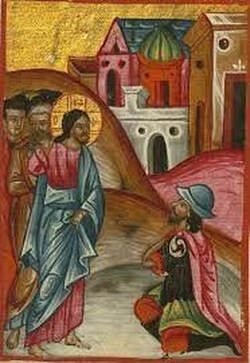 Matthew 8:5-13 Here is Father Julian's homily for this week. Click anywhere on this text to open the document.
0 Comments
Here is Father David's homily for the Sunday of All Saints
Apostles Fast and The Holy, Glorious, And All Praised Leaders Of The Apostles, Peter And Paul28/6/2021
John 9:1-38 Please click on the link below to read Father Julian's homily for the 6th Sunday of Pascha.
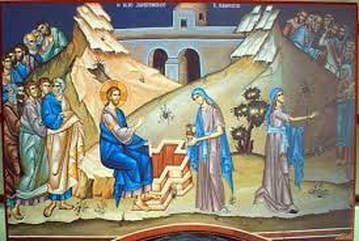 (John 4: 5-42) Please click on the link below to view the homily from Father Julian.
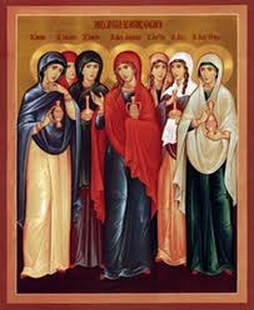 At this time we are fully in mind of the early witnesses of Our Lord’s great event; His Resurrection from the dead. Their witness is so important, they assure us firmly of the Resurrection. After our preparations in Lent, the intensity of Passion Week and the glorious celebration of Pascha, we can be easily left with a sense of deflation on the week following. We may even wonder what it was all about. Unlike Metropolitan Anthony we may not have experienced “the life transforming joy” which was his first encounter with the Risen Christ. Last Sunday we thought of St Thomas and the great blessing he brought for us. Often, he is regarded as the doubting but for us we regard him as the blessed one. He was hardly more doubting than the others. When the Myrrh- bearing women, whom we remember today, came from the tomb saying they had seen an angel who informed them of Christ's rising, the Apostles did not believe them. They also were full of doubt, but the Myrrh- bearing women were jubilant, they had seen the empty tomb and rushed with excitement to tell the other disciples and Apostles; they believed and were the first witnesses. Thomas was fortunately absent on the first visitation of Christ so that, by Our Lord’s will, a week later, he could be a great witness for us. He was not prepared to believe until he had seen for himself, but then he was able to make a very definite commitment, saying, “My Lord and my God!” To which Our Lord was able to reply: “You believe because you can see me. Blessed are those who have not seen me and yet believe.” This is the blessing for us, by touching the wounded flesh, he cured the world of our disbelief. Through his doubting, and search for truth, he became a firm witness to the reality of the Resurrection. Surely, all of us have doubts from time to time. It is easy to shout, “Christ is Risen!” but do we really believe this in our hearts so that our life is changed. Thomas saw and touched and said that not only he believed that Jesus, the earthly Jesus was Lord, but he also was able to say, in his heart, “You are also my God, a member of the Holy Trinity. Thomas then went on to be one of the greatest Apostles, travelling all the way to India to establish the Church there. We also should say, “Christ is Risen, my Lord and My God, now my life is to be definitely changed. We may not like Metropolitan Anthony say that we have received “life transforming joy” which, like him we feel compelled to share with others. (He was awarded an honorary Doctorate by the Presbyterian Faculty of Theology in Aberdeen, “for preaching the word of God and for a revitalising effect on spiritual life in Great Britain”). But we too, if we reflect on our lives, will have had life changing experiences, when we have been certain that the Lord has been there with us. Perhaps we will have been aware of His presence, His guidance, His help when something has worked out better than we expected. Sometimes, others will have made a comment which we knew was from God. Then there are times when His presence in prayer or in the Liturgy seems very real. Many times, if we are careful to note them. Christ’s resurrection appearances were not always immediately recognised. When the two disciples were on the way to Emmaus. Jesus walked with them several miles and they did not recognise him. Not until, at table, did they see him in the breaking of the bread. Then, they exclaimed, “Did not our hearts burn within us“ as He walked with us. Again, for our instruction. Like St Thomas, Cleopas and Luke, on the road to Emmaus, felt the heart burned within them at the presence of Our Risen Lord. This is how Our Lord reveals Himself, even if we are no longer able to see Him. Metropolitan Anthony, our founding bishop, as a teenager, was no longer a churchgoer and did not believe. After an inspiring talk by a visiting priest, he decided to read St Mark's Gospel to see if there was any truth in it (he was rather of the opinion that there would not be). As he read, he was aware of another presence in the room, and he knew that this was the presence of the Risen Christ. From that moment his life was changed, he experienced “life-transforming joy” by this experience of Christ. Many have had a similar experience. One of our priests before ordination, had been estranged from the Cathedral for many years. Whilst listening to the broadcast Paschal Liturgy from the Cathedral one year and hiding in a boxroom so that no one would hear, he was suddenly aware of a presence, and knew this to be that of the Risen Christ. He re-joined the Cathedral and in due course was ordained a priest. I have probably, before, told you of a friend of mine, a doctor. He and his wife did not leave their room in the morning until they were sure in their hearts that Christ was Risen! This could be a good intention for us also. When we say Christ is Risen, we should know in our hearts that this is true, and our lives are changing as a result. When our hearts burn within us, we should say with St Thomas, “My Lord and My God or with St Francis, “My God and my All”. “Robed in sincere righteousness whiter than snow, let us exult in the Paschal celebration, remembering the day on which Christ, the Sun of Justice, rose. Risen from the dead, He allows us to rejoice in His immortal brightness” (vespers Thursday evening of the week of Thomas) and our lives are changed. This is our blessing for Christ is Risen indeed. Father David I wonder if this sounds familiar to you… We were travelling by car, and I was trying to get our passenger to appreciate our native countryside. However, after a quick look out of the car window, the passenger continued to scroll on a mobile phone. Or how about this one; “Just listen to this beautiful piece of music I have discovered”, I said. After little more than 10 seconds the monologue recommenced! C S Lewis talks about ‘The Secret Thread’ that common quality that makes you love something, though you cannot put it into words; but most of your friends cannot see it at all. They are looking at the same thing that you are looking at but there is a gulf between what you are seeing and what they see. I think there is a parallel between the examples above and the events recorded in the gospel reading for today, Palm Sunday. I am sure we are all very familiar with the images portrayed in our icons, that accompany the gospel accounts of our Lord’s entry into Jerusalem (John 12: 1-18). Jesus entering Jerusalem riding on a donkey (v 14-15), How the crowds, ‘when they heard that Jesus was coming to Jerusalem, took branches of palm trees and went out to meet Him, and cried out: “Hosanna! [which literally means “Save us, Lord!”], ‘Blessed is He who comes in the name of the Lord! ’The King of Israel!””. These people are they who had seen, or heard, how Jesus had called Lazarus from out of his tomb (v 17-18). “Save us, Lord!”, for years the people had been languishing under the yoke of Roman occupation, soldiers everywhere, constant threats of violence and heavy taxes. They were tired weary and wanting their freedom! And here, on a “red carpet” of Palm branches rides Jesus, the liberator, the man who could raise up an army and free the people! The freedom that is obtained with spears, swords and bloodshed. The crowd believed that they were on the threshold of a great battle that would change everything. As with the examples I gave earlier, the people just could not see the ‘Secret Thread’ the true beauty that linked all that they had seen and heard. Yes, Jesus would free people. Yes, Jesus was going into battle, but not to fight flesh and blood. The people were looking and not seeing, hearing but not listening. We have each endeavoured, in whatever way we can, to make a Lenten effort. And we may well feel tempted at this time.; tempted by hunger, tempted by sloth and a reluctance to go to church, to stand in prayer, tempted to gratify ourselves with worldly delights. We may even feel tempted in the same way that those who cheered Jesus felt tempted; tempted to demand our freedom from everything and everyone that we feel oppresses us! As our Lord rides into Jerusalem, he faces temptation as never before – the crowds cheering him and begging for him to lead them into battle against the Roman occupying forces. But He is not that kind of leader. He is no earthly King. He is the heavenly King. The like of which the world has never known. A humble king, crowned with thorns, spat on and mocked, enthroned on a cross. This is the victory of Palm Sunday! The humble king who rides into Jerusalem, tempted in every way, keeps his eyes fixed on the Cross that stands before him. In the same way that the heavenly King entered into Jerusalem, today, Christ prepares to enter our hearts. To enter, if invited, and to fill us with his power, his strength, his love to give us the victory and freedom we long for; to invite us to follow him and to lay down our lives as he did: for our brothers and sisters, our neighbour even our enemies. Fr Julian Today the grace of the Holy Spirit has gathered us together,
and we all take up Thy Cross and say: Blessed is He that comes in the Name of the Lord; Hosanna in the highest. As I sit reading and preparing this homily, I cannot help but smile as the song of a Chiffchaff drifts through the open window. The Chiffchaff is perched high in a neighbours tree. I always find trees beautiful, but at this time of the year, with their new leaves, delicate blossom and resident wildlife, they have a very special beauty. Of course, the books I am looking at are inextricably linked with trees. These links go far beyond the manufacture of paper! For example, ‘Folio’, which today refers to a book of very large size, is from the Latin for ‘leaf’, which is itself a term for a book’s pages. Trees are the oldest living things on earth and, interestingly, they are mentioned in the Bible more than any living thing other than God and people. There’s a tree on the first page of Genesis, the first Psalm, the first page of the New Testament, and the last page of Revelation. Whether it is the fall, the flood, or the overthrow of the Pharaoh, every major event in the Bible has a tree marking the spot.
Again, the texts of our service abound with tree references. The following are quotes from Matins for this Sunday.
Today, the third Sunday (and middle) of Great Lent the Church sets before us the cross of Christ; a cross made of wood on which the carpenters’ son was nailed. Why do we Exalt the Holy Cross, today in the middle of the Fast? “We venerate the Cross of Christ, by which the power of the demons and the deceit of the devil were destroyed.” These are the words of St John of Damascus and, following this tradition, the Orthodox Church has consistently celebrated the cross as an emblem of victory; just as Melito of Sardis proclaimed, “Just as from a tree came sin, so also from a tree came salvation. By the cross death is destroyed, and by the cross salvation shines; by the cross the gates of hell are burst, and by the cross the gates of paradise are opened. . . . The cross is the destroyer of hell” St Athanasius of Alexandria declared, “His trophy over death was the Cross.” And later, “The death which they thought to inflict as a disgrace was actually a monument of victory against death itself.”, “The Cross of the Lord is a sign of victory over death.” Similarly, Rufinus observes, “The death to which He submits is going to result in the despoiling of death.” Maximus the Confessor affirms, “By being conquered deliberately, He conquered him who hoped to conquer and snatched the world from his dominion.” The contemporary theologian and hierarch Metropolitan Kallistos Ware comments, “What has been fulfilled? We reply: The work of suffering love, the victory of love over hatred. Christ our God has loved his own to the uttermost” (The Orthodox Way). Mel Gibson’s 2004 film The Passion of the Christ, is well known for its depiction of the brutality and gore of Christ’s punishment and crucifixion, an attitude common to many western Christian paintings. Orthodox icons, however, depict not a ‘victim’ but a ‘victor’. Our icons of the crucifixion do not belabour or emphasize the horrors of the suffering. Rather, they show an almost regal dying Christ receiving the dismayed shock of believing onlookers. They show the expression of faith of the Roman centurion who confesses the crucified Christ as “the Son of God” (Matt. 27:54; Mark 15:39). I wonder how it would be if every time we saw a tree, we viewed it as an icon? If every time we saw a tree, we remembered the Cross and the Resurrection, giving thanks for our Lord’s victory? Perhaps then our lives would begin to become the Eucharist that never ends? Fr Julian We venerate Thy Cross, O Master, and we glorify Thy Holy Resurrection
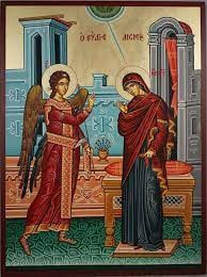 he Feast of the Incarnation is perhaps the most significant Feast of the Church. Without this beginning the would be nothing, without Mary, no Incarnation. Our language may seem extravagant and our frequent references to Mary in our prayers may seem excessive, but both mark the immense importance of Mary in the life of the Church. Recently, a member of the Baptist Church remarked to his friend, ‘we have not paid enough attention to the role of Mary’. We in Orthodoxy have. God’s overflowing with love and goodness created mankind as the true image of Himself, He made man and woman in the image of God and let them share His sovereignty, His overall care of Creation. Only men and women in the whole of creation are made in the image of God. Sadly this sovereignty had been disfigured and diminished and had to be restored, but how? Here was God’s plan. In order to restore man and woman and creation to it’s original beauty, the Creator Himself, God Himself had to become incarnate, take on our nature in it’s fullness. The only way was to have young maiden, a virgin who could take on this role. Nicholas Cabasilas in his sermon for the Annunciation describes how God was overjoyed when He was aware that such a woman existed and because of her purity, her devotion, her perfection, He, God, could not wait longer for His plan of action to be put in place. The incarnation was now possible. Mary retained the innocence and purity of childhood and continued to be so close to God in her prayerfulness without distraction. She was always aware that she was in God’s presence and, indeed, she had become His handmaiden. ’Behold the handmaid of the Lord’ spilled instantly from her lips when challenged by the Angel Gabriel when he visited her. ‘Blessed is the fruit of your womb, O all pure one,’ was His reply." And so we in turn exclaim. "O Virgin Mary, the light of God dawned from your womb, spreading over the whole earth, the light of God’s threefold nature. Through you, O pure virgin, through God’s rays, earth became another heaven" "Praise the Lord, all you His works; exalt Him above all for ever." Our Lord born of Mary, took his flesh from her - Mother like son. His disciples must have seen her in him and him in her. Incarnation means that everything of the mother is passed into the child, not only physically, but emotionally, mentally and spiritually. All this arises at birth, a potential to be developed in loving care and upbringing. Mary’s emotions, love , care, devotion were there to bring up her son. Her personality and devotion to God, were there to guide. Her spirituality and prayer poured into him. She gave him his full humanity. "Blessed indeed is the fruit of your womb and blessed are you who formed him and nurtured him into the fullness of the image of God. By your purity and closeness to God he was fully enabled for his life ahead." Yes, he was God, but it was Mary who gave him his human nature and ensured that by giving birth to him and nurture of him, he became the full, undistorted image of God in man. One of the most beautiful hymns is to be found in the First Hour, said daily: "What shall we call thee, O thou who art full of grace? Heaven, for thou hast caused the Sun of Righteousness to rise? Paradise, for thou has blossomed forth the Flower of Immortality? Virgin, for thou hast remained without corruption (sin)? Pure Mother, for thou hast held in thy holy embrace a Son, who is God of all? Beseech thou him to save our souls." The Troparion of the Feast marks its significance for us: "Today is the beginning of our salvation and the revelation of the Mystery that was planned from all eternity. The Son of God becomes the Son of the Virgin, and Gabriel announces this grace. Let us join him in crying out to the Mother of God: “Hail, O full of grace, the Lord is with you!” Fr David 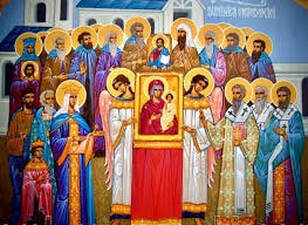 On this day we celebrate the return of Icons into our life in the Church. They were lost and now they are found, they were ‘dead’ to our awareness but now they are ‘alive’ and fill us with their life. We are immediately led to recall the Parable of the Prodigal Son, three Sundays before Great Lent. We could not be together this year in our reduced, ‘lost’ state, but perhaps it is worth considering in our celebration of Orthodoxy, a celebration of restoration. In the parable, the younger brother, restless in the confines of the home where he had been born and brought up, seeks to explore the world and demands the wherewithal to do this. His Father, out of unconditional love, allows him to go and gives him a good endowment. The young man goes off to a far country and wastes his life in prodigality, this simply means recklessly wasteful, and we should not accept the older brothers’ thoughts without consideration. The Publican, the Pharisee and now the Prodigal are chosen to remind us of aspects of ourselves, and our lives past, as we stand before God in Great Lent. The central theme of the story is not prodigality but restoration and a new beginning. The younger brother, the parable explains, ‘came to himself’, realised what a mistake he had made, and so returned to his father’s house and his Father, ‘seeing him afar off’ runs out to meet him, to welcome him back, to put upon him a robe (of righteousness), a ring on his finger (the signet of reintroduction to the family), and sandals on his feet (of the Gospel of Peace). My son ‘was dead and is alive again and was lost and is found.’ With the rediscovered icons, found and ‘alive’ again, we too, in Great Lent are found again and made alive again. Fasting, almsgiving and prayer helps us to return to our Heavenly Father, to have our robe, ring and shoes restored in this wonderful season. It is a season of repentance, turning again, and a season of Great Joy. Perhaps more than ever this year, as lockdown is eased, we are not only fully restored and welcomed into the home of our Heavenly Father, however much we have been prodigal during the past year, but we are also able to gather again as members together of His loving family. Restored, as were the Holy Icons, we go forward into the Restoring Grace of Great Lent. May God bless us and guide us. Fr David |
Parish Blog
This mainly contains homilies and messages from our priests, although there is some scope to share thoughts and interesting articles which we may want to share with others Archives
October 2022
Categories |
|||||||||||||||||||||||||||||
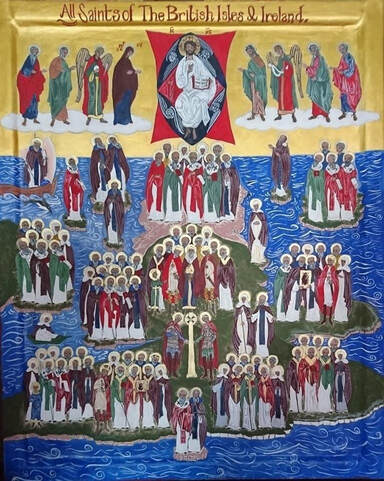
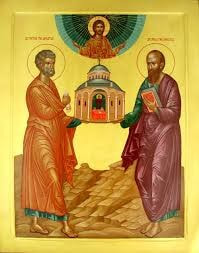
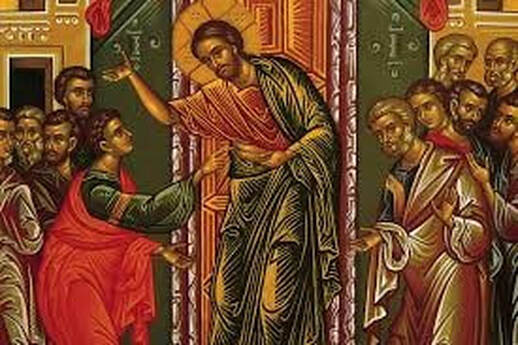
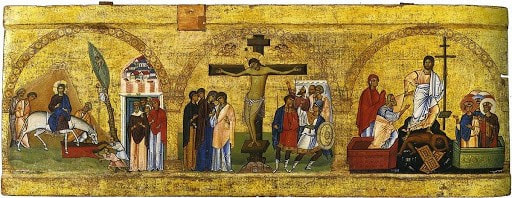

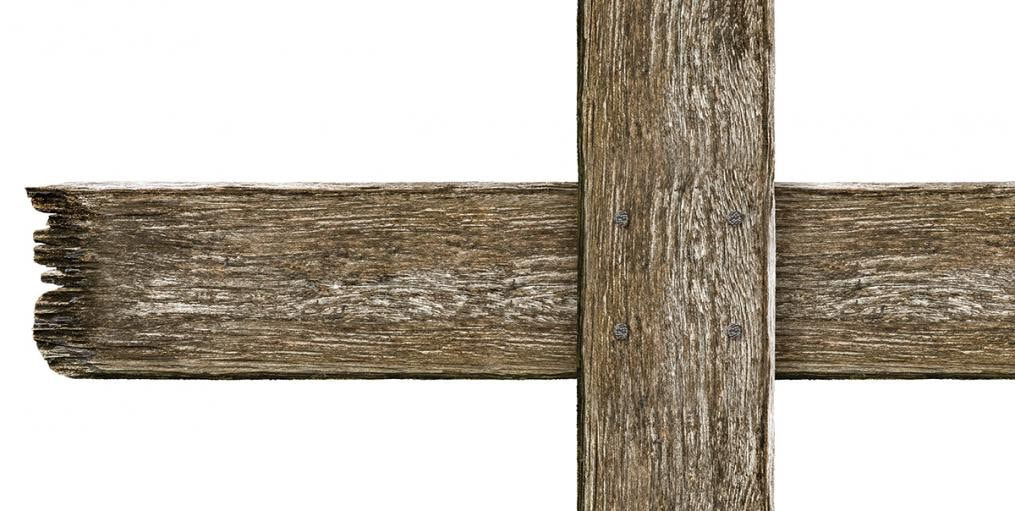
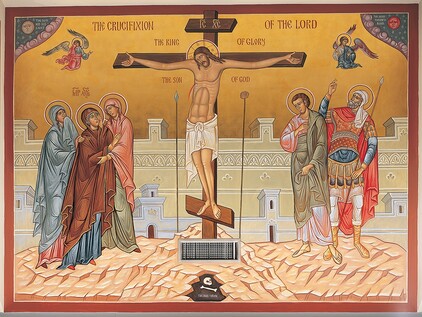
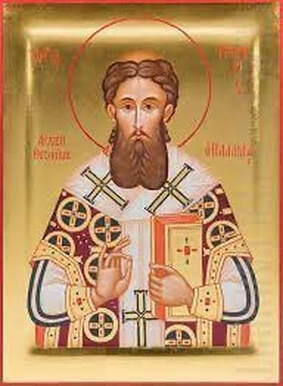
 RSS Feed
RSS Feed